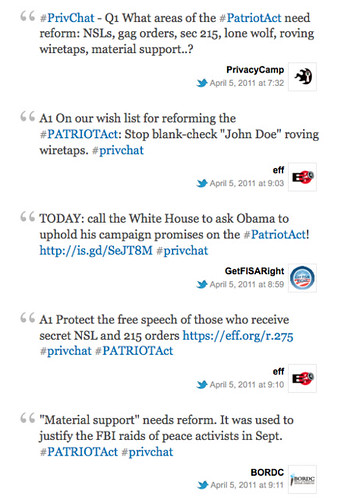Update, August 2: discussion of Google+ and HR1981 in a new comment
Originally written January 19. Updated January 24, after discussions with Weaver2World and MissHealth.
I modified one of the recommendations and added a new one. See the pink highlights in the text.
Mark Stanley of the Center for Democracy and Technology wrapped up Tuesday’s #privchat with a heck of a good question. And as is usually the case in the weekly Twitter privacy chat, there were good answers from a variety of perspectives. For example:
All great ideas … so I put my process hat on and suggested that we encourage people to think and blog about it, and continue the discussion next week. Here’s my contribution (with early assistance from @hellrazr of @PrivacyActivism and additional suggestions from @Weaver2World).
Let’s start by looking at #privchat’s strengths. As Shaun (aka @PrivacyCamp) pointed out, there’s a range of views: libertarians who think the market will take care of everything, folks like me advocating for stronger government action, technologists and business people who see challenges and opportunities. It’s a unique chance for a range of high-quality viewpoints — even the people I vehemently disagree with usually state their position well. A lot of journalists participate, and so do some of the most interesting privacy-focused startups. As a group we seem to get along pretty well, with a lot of mutual respect. And (an advantage it’s easy to overlook) we get together regularly; just like a big in-person meeting at work, it’s often a great chance to catch up with somebody and say “oh btw …”
Balanced against those strengths, there are weaknesses as well. Most obviously, we only interact once a week. And we’re very US-focused.
So with that as a background, here are some ideas:
- Have one of the segments in each meeting devoted to an activism campaign. We’ve already done that at least once: in early January, I asked for feedback on the social network activism campaign for EPIC’s The Stripping of Freedom campaign, and it was very helpful.* From an activist’s perspective, as well as the feedback it’s a great opportunity to build awareness. From the community’s perspective, it deepens connections by working together on shared goals. Based on last week’s experience, it might be best for it to be the first section — that way the people who are especially interested in the campaign can continue to discuss for the rest of the hour — but it’s worth experimenting to see what works best.
- *NEW* Get the basic infrastructure in place: a web site where people can find out about #privchat and and get transcripts (and the #privchat daily), a Twitter list, “getting started” instructions, etc. Try to post most topics in advance along with links so people who don’t have background can get up to speed if they have time.
- Invite people from the companies we’re talking about to join us.  It’s easy enough for them to attend: a segment is only about 10-15 minutes long, and they don’t even have to leave their desk. For example, we’ll probably have another discussion about Facebook app privacy one of these days, and the Facebook group who’s working on it might well be getting a range of viewpoints — to listen, or brainstorm, or get feedback potential solutions or messages before rolling them out.
- Building on the positive theme Jim and Warren mentioned, look for opportunities to help the startups who are regulars at Privchat. Ghostery, Secret123, Reputation Defender, Abine, Preference Central et. al. probably have more ideas of what would be useful than I do, but one thing we could do is encourage them to post any ‘news’ announcements on Monday (before #privchat) and RT the ones that would be of interest to our followers. That way the #privchat daily would have a good overview about what they’re up to. Win/Win!
- *MODIFIED* Take on group projects that broadens discussions beyond the one hour of #privchat itself. The #ThankTwitter campaign that emerged from last week’s meeting is an early example.  A couple possible next steps: mapping the connections of the privacy community (useful for companies and legislators as well as advocates), and analyzing a complex issue like DNT and presenting a range of high-quality perspectives.  With Congressional hearings and legislation coming up on a variety of issues, there are plenty of topics where the intellectual diversity and the quality of the group could really have an impact on the debate. And this would also help our journalist members by giving them something to write about!
- Help @clarinette02 get her tweets visible on the hashtag. If we all Tweet to Twitter at the end of the next chat, maybe her six-month-old support ticket will finally get looked at.  If that doesn’t work, I’m sure there’s something else we can try.
These are just starting points, and I’m sure there are plenty of ways to improve them. Feedback welcome, and I’d love to hear what ideas others come up with: in the comments here, other blog posts, and of course on Twitter.
jon, aka @jdp23
* credit where credit’s due: #journchat was the first time I did this, thanks to @PRSarahEvans; and it’s worked out well there too







Leave a Reply